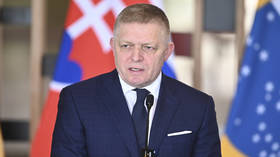NATO gives thumbs-up to U.S. missile shield in Europe
NATO members meeting in Prague have said plans for a U.S missile shield in Europe should go ahead. The alliance also said it would be a mistake to resolve questions of European and global security without Russia, who strongly opposes the plans.
“They hoped to invite larger numbers to this conference, including the U.S. Secretary of State. But in the end the format of the conference became narrower and narrower. For some reason they did not invite Russia, even though all NATO members emphasise that the question of anti-missile defence is a question of Russian-American relations, two great nuclear powers who should seek their own answer to this question,” Rogozin said.
“NATO is more of an observer here. If in the end we are forced to deliver a response, then they will immediately want to talk to us again. Their approach, it seems to me, lacks forward-thinking. It would be better to come to an agreement from the start,” he added.
The Czech Prime Minister, Mirek Topolanek, meanwhile, has called a planned radar station near Prague a key element of the European missile defence system, and a significant contribution to European security.
However, among the Czech population, opposition to the plans is widespread.
When the conference ends a rally against the US plans will be held in the centre of Prague. The rally has been called ‘No to bases.’
Jan Tamas, the leader of the movement claims that more than two thirds of Czechs oppose the plan to construct a missile shield.
“The opposition is very strong and it is intensifying as the agreement is getting nearer to be signed,” he said. “We think people need to wake up to this call. This is really something that will destabilise the region.”
Meanwhile, Poland is unhappy at a U.S. decision to assign just $US 20 million to modernise the country’s armed forces, according to Rzeczpospolita newspaper.
The deal would be in exchange for allowing the deployment of parts of a missile-defence system.
The paper reports the U.S., which is planning to deploy ten interceptor missiles in the country, could make an official proposal this week. A delegation from Washington is expected in Poland on Tuesday. According to media reports, Poland considers $US 20 million insufficient, but is prepared to hold further negotiations.












